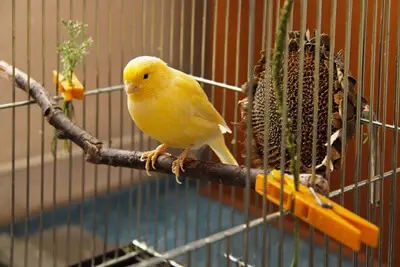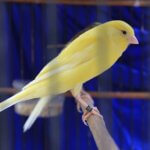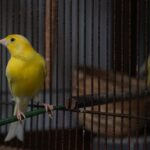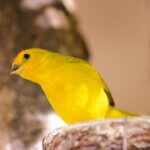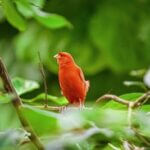Canaries usually defecate regularly, pooping every 15-20 minutes on average. This is due to their fast metabolism and frequent eating habits. So, it’s worrying if your canary stops pooping suddenly.
Canaries can get constipated, but it’s uncommon. The greater concern is that not pooping can signify a different underlying health condition.
According to the Veterinary Nursing Journal, recognizing signs of illness and disease in birds is difficult, even for veterinarians, because they’re good at hiding their illnesses.
So, the frequency, consistency, and color of a canary’s waste will tell you a lot about its health and well-being. In fact, if your canary stops pooping entirely, this is a strong indicator of illness.
What Is Constipation?
Constipation is infrequent, dry, or hard feces that can be painful to pass. In some cases, the hardness of the poop can lead to impaction, wherein a canary can’t pass any feces.
All animals can be affected by constipation. However, it’s worrisome in birds due to their fast-paced metabolism. Waste can quickly accumulate in their guts, leading to health complications.
A lack of soluble dietary fiber most often causes constipation. However, there are other possible reasons for a canary not pooping, such as:
- Over-eating
- Dehydration
- Diet lacking in oil
Certain medical conditions and illnesses can also lead to constipation in canaries. Unsurprisingly, most are based in the stomach or digestive system, such as:
- Gastroenteritis
- Diverticulitis
- Organ diseases, such as lupus or sclerodermas
- Intestinal obstructions
- Masses on the cloaca
In some cases, constipation is a symptom of a greater issue rather than an issue on its own.
Signs of Constipation in Canaries
The most reliable symptoms of constipation include
- Lack of appetite
- Irregular production of fecal matter
- Hard or dry feces
- Straining to pass waste
- Pain passing waste
- Blood in waste
If you suspect your canary is constipated, you can check by taking note of the amount of fecal matter that builds up in the time between cage cleaning sessions.
If there’s a noticeable reduction in the amount of fecal matter in the bottom of your canary’s cage, it’s recommended that you seek veterinary attention and care.
A short spate of constipation will be uncomfortable for your canary. However, prolonged or severe constipation can be damaging in the long term, as untreated constipation leads to:
- Fecal impaction
- Incontinence
- Hemorrhoids
- Damaged intestinal tracts
So, keep track of your canary’s waste habits. Though it may seem strange initially, familiarize yourself with the normal consistency and color of your canary’s waste.
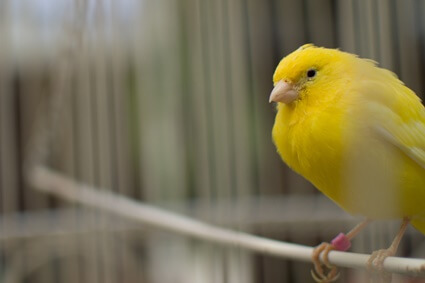
What Should Healthy Canary Poop Look Like?
A canary’s feces is made up of three parts:
- Solid portion
- Milky portion
- Liquid portion (urine)
Healthy bird feces should be a mix of soft solids, milky-white semi-solids, and liquid.
It shouldn’t have a strong smell. It’s normal for the solid part of canary waste to be green. As long as this section doesn’t become a noticeable dark green or black, it’s considered healthy.
Extremely dark or black solids may indicate internal bleeding. Likewise, if the color becomes brown or reddish, this could signify internal bleeding or parasitic infection.
If the white section of your canary’s feces becomes more yellow, this may result from bile staining, which can be caused by liver disease.
Bird feces should also be odorless, especially if it’s fresh. If your canary’s feces has a bad smell, serious gastrointestinal problems could be responsible.
Most of all, your canary’s feces should be liquid but firm, holding its shape where it’s dropped. If the fecal matter in the cage seems to be water or spreading after being dropped, it could be diarrhea.
If the droppings are extremely thick, hard, and dark, this is likely due to constipation.
Can a Canary Die from Constipation?
Constipation alone isn’t life-threatening, as long as it is temporary and promptly treated. However, if you ignore the signs of constipation, there’s a chance that fecal matter could become impacted.
In this situation, your canary could die due to the blockage. If you’re concerned that your canary has an impaction, you should contact a vet immediately.
A small bird, like a canary, may need to poop 40-50 times a day. So, that material will build up quickly and cause various health problems.
The chances of a canary dying from constipation (not impaction, which is different) are slim.
According to Avian Physiology, issues such as masses on the cloaca, egg binding, and digestive or reproductive system diseases are more likely to lead to complications and fatality.
Since constipation in birds is so rare, it’s important to check for these life-threatening health issues before treating a canary for constipation.
How To Treat Constipation in Canaries?
Ensure your canary gets the right kind of food in the right amounts. An unbalanced diet is one of the most likely causes of minor or recurrent, non-severe constipation.
Common dietary issues that can cause constipation are a lack of property fiber, oils, or water. You can determine whether a bad diet is the cause of constipation by providing it with:
- High-fiber vegetables (broccoli, spinach, and green beans).
- Oil (vegetable, coconut, or olive oil)
- High-fat food, such as sunflower seeds and nuts
You should also check your canary for signs of fecal buildup around its rear. Clean away visible debris with a soft cloth and tepid or warm water to ease discomfort.
Canaries have fast metabolisms, so you should see an improvement within 1-2 days if a poor diet is responsible. If your canary remains constipated or its symptoms worsen, consult a vet.
If an expert determines that tests are needed, your vet may still offer options for easing discomfort.
A vet may have limited options for treating constipation in small birds, such as canaries. Aside from dietary changes, a vet may recommend extra fluids and exercise. If your canary is particularly unwell, an avian vet may provide fluids at the clinic or prescribe a laxative to ease the passage of waste.
Due to the diminutive stature of canaries, more intensive treatment may require that the vet remove blockages and masses through a surgical procedure.

